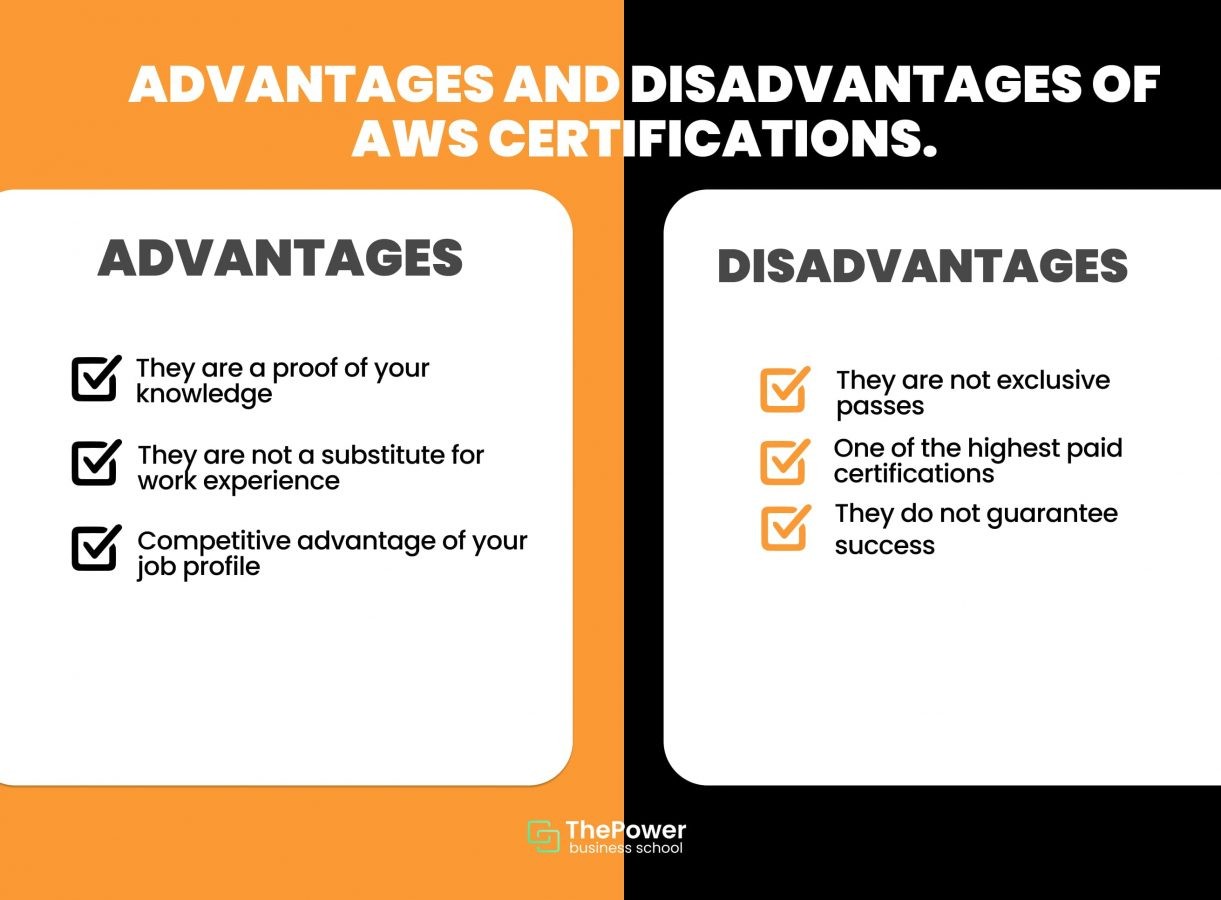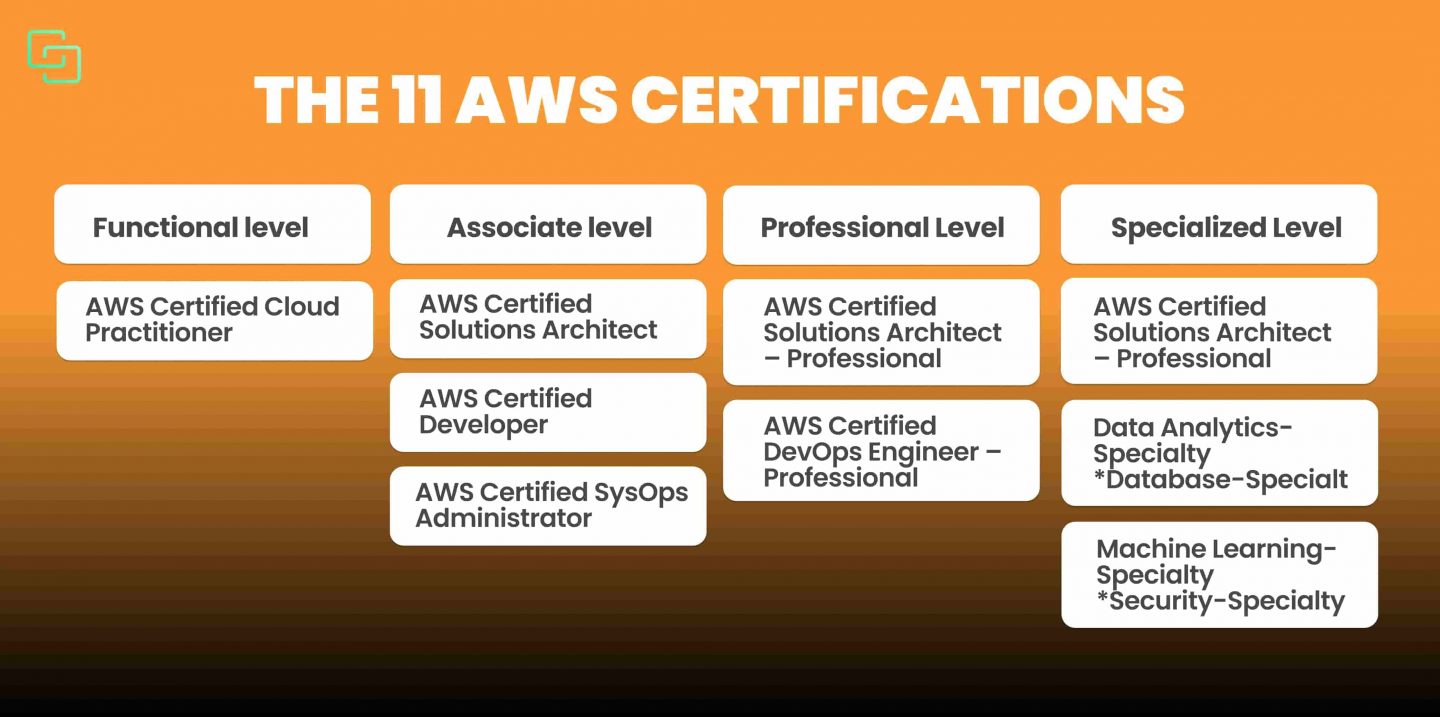What are AWS certifications? + the 4 certifications you can choose from

Franco Brutti
So, here you are, researching what Amazon Web Services (AWS) certifications are, wonderful!
Did you know that cloud computing skills are the latest trend in the working world? Yes, they are indeed in high demand, but what does this have to do with AWS?
Well if you're looking to take the next step in your company or want to develop new skills, Amazon Web Services has a lot to do with it.
Want to know what this is all about? In that case, you need to read on.
What are AWS certifications and why are they important?
AWS is nothing more than a certification, whose credential is highly recognized in the IT industry.
How? If you are a student, it validates your cloud experience with Amazon Web Services technology.
It helps incredibly when looking for a job because companies recognize this certificate as a sign of qualification in the area.
In addition, they are valid for 3 years, so once you pass the necessary exams, you have plenty of time to look for a job and demonstrate your knowledge.
However, this technology is constantly developing, so it requires you to demonstrate that you are still qualified. How is this done? Through a process called recertification, where you demonstrate your AWS skills again.
But before we move on, let's look at the advantages and disadvantages of these certifications:
Advantages
Proof of knowledge: they prove that you are competent to pass the certification exam.
Open doors for job growth: they can lead you to an interview or to the consideration set for a promotion in your job.
Relevance in today's market: average salaries for AWS certificate holders exceed $100,000 USD per year. AWS certifications are some of the highest-paying cloud certifications out there.
Disadvantages
They don't give you work experience: there are no substitutes for working in the cloud. However, there are many ways to get hands-on AWS cloud training outside of the workforce and thus, boost your cloud career with minimal experience.
They are not exclusive passes: a common question is, "Will I get a job from having an AWS certification?" They don't guarantee you'll get the cloud job of your dreams, but they can help you succeed. It's up to you to earn it from there on out.
They don't guarantee your success: they only validate your knowledge, so from there on out, what you do with your skills is up to you alone.

What is Amazon Web Services for?
The market offers a wide variety of advantages for companies that use this service:
Cloud storage.
Networking.
Databases.
Applications.
Messaging.
Artificial Intelligence.
Mobile services.
IT security.
Identity and compliance.
What can you do as AWS?
With a presence in more than 190 countries, it is undoubtedly a platform that offers a lot of versatility in its uses, but let's see exactly what you can do:
Host applications on infrastructures for SaaS projects.
Backup and storage to back up and store information in the cloud with the highest quality standards in the industry.
Host databases through SimpleDB and Amazon RDS, which allows you to configure and scale databases as your company needs.
Offers the ability to support all types of E-commerce.
Distribute content on a high-performance delivery platform capable of distributing and streaming content.
At this time, is it worth getting AWS certifications?
It's a valid question in the IT world, considering it's so ever-changing, but the truth is yes, AWS certifications are worth it, but you have to ask yourself the reasons for getting such a certification.
Remember that depending on the area of work and/or the purpose for which you want to acquire Amazon Web Services certifications, you can get real value out of it. Let's look at some hypothetical questions:
Do you want AWS to get you a job interview or, directly, a job position with a company? It's possible.
Did your boss say you need to get certified? Maybe you should pay attention to his or her recommendation.
Do you think that thanks to the AWS certification you will get a salary up to 6 figures? It's not as simple as you think.
Remember that AWS is the path, not the end goal.
As of March 2022, there are 11 individual certifications. Each of them has a different function and different goals, so keep in mind what you plan to use them for. We’ll mention them all:
Foundational Level
If you are interested in IT and already have a related career, this may be the perfect opportunity to expand your portfolio. At the moment, there is only one single type of certification you could go for in this case.
AWS Certified Cloud Practitioner: basic, demonstrate your knowledge of AWS cloud principles. You do not require experience as such to obtain it, since as we told you before, it evaluates all the fundamentals at the level of basic AWS architecture, services, security, and compliance.
Associate level
If you are considering this level, you ideally have a few years of experience working with the AWS cloud, either troubleshooting bugs or coming up with solutions.
Here you'll delve into functionality, application builds, hybrid system implementation, hands-on design and application development, and secure environments.
AWS Certified Solutions Architect: Requires hands-on experience in designing distributed, cost-effective, fault-tolerant, and scalable systems on AWS.
AWS Certified Developer: Delves into DynamoDB, Elastic Beanstalk, SQS, and SNS services.
AWS Certified SysOps Administrator: Develop skills in CloudWatch.
Professional level
We enter a more demanding field, which would ask you for at least 2 years of experience in the comprehensive use of the AWS cloud. We’re talking about design, operation, and troubleshooting. We find 2 types of certifications:
AWS Certified Solutions Architect - Professional: you will be able to take any AWS feature or service to use as needed.
AWS Certified DevOps Engineer - Professional: DevOps is a combination of development, operations, and the ability to guide systems over time. We are talking about scalable systems.
Specialized level
Do you already have all the prerequisites mentioned so far? Then you can go big by specializing in the use of AWS cloud services. One of these options will be your chance to take the next step in your career.
Advanced Networking-Specialty: validate your expertise in designing and maintaining AWS network services.
Data Analytics-Specialty: you validate your expertise in the use of AWS Data Lakes, as well as the analytics services to collect information based on the data collected.
Database-Specialty: this is one of the most recent certifications included, and it validates your ability to recommend, design and maintain solutions in AWS database services, based on business needs.
Machine Learning Specialty: also recently added to their program, this validates your expertise in creating, training, tuning, and deploying Machine Learning models on AWS.
Security-Specialty: validates your hands-on experience securing workloads on AWS.

Which AWS certifications do you need?
So we have 11 Amazon Web Service certifications in total (for now, because maybe in the future they will add more), spread over several levels and discipline areas, so you should choose the one that best suits your current profile and professional area.
If you are the type that just wants to collect them all, sooner or later you will look for a way to take them all. But what if you're pursuing a more focused track or considering a career change to cloud computing?
Which AWS certifications should you pursue? This is the question we seek to answer below, but of course, this is all going to be up to you. We'll give you some hypothetical cases and some examples:
Do you want to learn to stay informed about AWS cloud technology?
Do you plan to work with this technology without having direct contact with it? Let's say in marketing or as an executive. In that case, maybe you should go for the AWS Cloud Practitioner certification.
By earning this certification, you'll be able to keep up with your IT teams and understand cloud concepts well enough to think about how they can be applied to cloud innovation in your company, industry, or sector.
Want to boost your cloud computing career?
If you're looking to pursue a career in cloud computing, you should definitely look into the AWS Certified Solutions Architect - Associate certification, as it is the starting point for the following certifications, as well as being one of the most popular.
The CSA: Associate certification is considered to be one of the most valuable certifications in the IT industry and it can not only help you start a career in the cloud but also gives you a starting point for additional AWS certifications.
Already working in the cloud, but want to improve your skills?
If you're already working in the cloud, you probably have the AWS Certified Solutions Architect - Associate and if not, you should take the exam, you're sure to pass, but that's not enough as you're ready for the next step.
A good place to start is with the remaining associate-level certifications: AWS Certified Developer and AWS Certified SysOps Administrator. From there, you can earn the two professional-level certifications or consider earning some of the specialty certifications.
Do you work in the cloud on a daily basis but want a specialized role and to master your area?
We've reached the ultimate level... If you already work in a specific area of the cloud, such as security or networking, the AWS specialty certifications are a natural path to follow.
You must have at least an associate-level certification (or an AWS Certified Cloud Professional) before you can earn a specialty certification, but once you meet the prerequisites, you can increase your knowledge in the specific area of expertise of your choice.
Which companies use AWS?
You may be wondering how these certificates could help you in the working world, but beyond the salaries you can get, as they boost your skills and your profile, allowing you to climb the ranks of almost any company, there are a wide variety of companies internationally that use AWS.
FC Barcelona.
Airbnb.
Pinterest.
NASA.
Nokia.
LinkedIn.
Foursquare.
Adobe.
SAP.
Shazam.
Spotify.
Are you ready to specialize in AWS?
If you've made it this far, first let us congratulate you. Not only have you taken the first step to grow at the job level, but also to start learning a little bit about what AWS offers in its different certifications, as well as the advantages and benefits it offers to companies.
Undoubtedly, this is your opportunity, but before you start your preparation to attack the job market, tell us, what level are you at, what is the AWS certificate you would study in this first approach? We would like to know all the details.
Looking for something specific?






